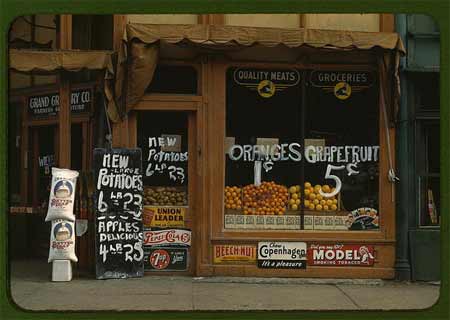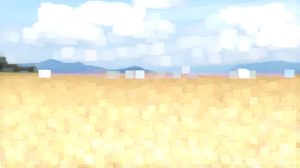
This essay is dedicated to Charles Bernstein
A poem I keep coming back to again and again is Charles Reznikoff’s “During the Second World War, I Was Going Home One Night,”1 first published in 1969. I first encountered the poem from hearing it in PoemTalk #562, and later had the opportunity to study Reznikoff in my poetics seminar. The reason that I find this poem so striking is that it seems like a kind of proto-Language poem, in addition to being an Objectivist ars poetica, despite (or perhaps through) the poem’s narrative structure. Also worth some attention is a critical difference in the way Reznikoff performs the poem and the way it exists on the page.
The poem details two brief encounters between the poem’s subject, the “I” of the poem, and a fruit vendor, during and after WWII. On the surface of the poem, we get a kind of subject-object relationship between the two figures, with the poem’s narrator as subject, and the vendor an object in his field. But looking more closely, it’s not just the poem’s subject trying to comfort a vendor whose son was fighting in the war; the poem unfolds into an intersubjectivity wherein the two men reciprocally provide support for each other. In the second stanza, when the subject returns to the fruit store, he notes, “I found myself once more in that street/and again it was late at night, dark and lonely;” The description of “dark and lonely” is the affect of the subject—not the vendor. We could also read the “again” to imply that not only was it late at night again, but that the subject is feeling dark and lonely and again, i.e. that he was in a similar mood the first time he visited. Pairing this with his upbeat language in the presence of the vendor, and the fact that he returns to the fruit store again, we might deduce that the companionship is bidirectional. In this regard, the poem is different than some of Reznikoff’s other poems, such as “Amelia,” where the poem is framed as a kind of detached observation of a scene.
But the most interesting aspect of the poem, to me, is its function as a commentary on language and the potential shape of the signifier. Reznikoff structures the poem such that the subject is the enthusiastic and more eloquent user of language. “You are sad…What is troubling you?” he first asks the vendor, who replies, in what the subject later describes as a “monotone”: “Yes, I am sad.” The uneven dialogue here, with the vendor speaking in an almost robotic, affectless cadence, implies that the vendor either doesn’t want to talk (because he is sad?) or, alternatively, that language is not his chosen method of communication. We see several other examples of the disparity in language use throughout the poem, including and especially when we learn that the vendor’s son returned from the war unharmed:
his thin wrinkled face was grim
but not particularly sad. “How about your son?” I said.
“Did he come back from the war?” “Yes,” he answered.
“He was not wounded?” “No. He is all right.”
“That’s fine,” I said. “Fine!”
I found interesting here Reznokiff’s use of, and lack thereof, contractions to smooth dialogue. The subject, who is clearly comfortable with language, uses contractions: “That’s fine”; the vendor does not: “He is all right.” Again, this shapes the subject into a dynamic presence and the storeowner into a kind of automaton, an affectless object.
The turn of the poem comes here, when the storeowner responds to the subject’s bonhomie:
He took the bag of apples from my hands and groping inside
took out one that had begun to rot
and put in a good one instead.
The apple that the vendor gives the subject is itself a non-lingual signifier, a sign that carries all of, if not more than, the affect/expression of the subject’s ebullient discourse. It is language made concrete and material. “Words are things, too,” said Charles Bernstein. It’s also a tangible manifestation of Zukofsky’s famous “rested totality,” in that the apple serves as a perfected, finished object that encapsulates the power of the poem. The apple is an objectivist poem within an objectivist poem–rested totality inside rested totality. (Interesting paradox: two contingent totalities.) As such, the poem presents itself as a metapoem.
The dialogue and the poem are completed with the storeowner having the last “word”:
He took the bag of apples from my hands again
and took out one of the smaller apples and put in a large one.
The apples are expressive of complex, nuanced feelings, the kind of feelings we generally fumble with language to define, not just tokens of gratitude to the subject. The vendor seems to express more with his statement (and revision) of the apples than the subject does with words, causing the reader to question which of the men is the subject and which is object. In this regard, the poem seems a kind of commentary on the limits of words and the presence of alternative semiotics. Even though the poem doesn’t look anything like a Language poem, I feel like it’s akin to Language poetry in this regard: Reznikoff subtly makes language something real and concrete in a way that causes the reader to ponder the material existence and physical limitations of words. The apple as signifier does not point, in any constant sense, to a fixed signified. We get the sense of the rough direction in which it points, but it resists the transparency that can undo the selfsame function in language. It’s not possible to read straight through the apple to some kind of fixed referent: we must stop and consider it as a material thing, and in doing so, consider how this reference is different than any other, particularly—language.
(Phono)text
It was surprising to hear that in both recordings of Reznikoff reading “During the Second World War…,” one from 19743 and one from 19754 (both available on Reznikoff’s PennSound page5), he reads an alternative version of this poem, one that amalgamates the two apple exchanges into one.
In both readings of the poem, Reznikoff elides these lines:
He took the bag of apples from my hands and groping inside
took out one that had begun to rot
and put in a good one instead.
He then amalgamates the two exchanges into one, reading the final two lines of the poem as:
He took the bag of apples from my hands and groping inside
took out one of the smaller apples and put in a large one.
So we get the first line of the first apple exchange in the text, followed by the last line of the text. Given that he chooses to read the poem the same way in both recordings, there must be some significance here. So the question becomes: why change the poem?
One guess is that Reznikoff felt that the replacement of the rotting apple was less expressive than corrective. The only way we could see it as expressive is if the vendor was consciously going to sell the subject a rotting apple. That wouldn’t make the vendor as sympathetic as otherwise (though one could make the argument that it makes him a more complex character). Another possibility is that Reznikoff is condensing the two exchanges into one in the spirit of Imagist-Poundian minimalism. Perhaps he felt that the two exchanges compressed into one kinetic expression yielded more force than the repetitive iteration presented in the text.
Personally, I think that the text of the poem creates a much more complex aesthetic. The version as performed makes the apple exchange into a simple show of gratitude; the subject is given a bigger apple as a sign of thanks. I think that the repetition of the process in the text of the poem creates a complex, dialogic exchange and the conversion of a subject-object relationship into an intersubjective encounter. The repeated process of trying to select the right apple to express the giver’s intended feeling mirrors the process of the subject trying to choose the right words—only it lays bare a process that would otherwise be backgrounded, at best, and transparent, at worst.
1 https://www.poetryfoundation.org/poems-and-poets/poems/detail/55500
2 https://jacket2.org/podcasts/without-house-and-ground-poemtalk-56
3 http://media.sas.upenn.edu/Pennsound/authors/Reznikoff/SF-1974/Reznikoff-Charles_35__During-the-Second-World-War__SFState_03-21-74.mp3
4 http://media.sas.upenn.edu/pennsound/authors/Reznikoff/05-13-75/Reznikoff-Charles_19_During-the-Second-World-War-I-was-going-home-one-night_05-13-1975.mp3
5 http://writing.upenn.edu/pennsound/x/Reznikoff.php





Leave a Reply